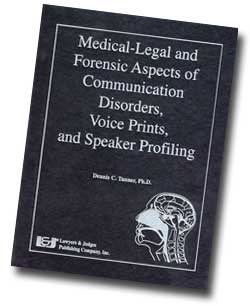From the medical and legal aspects of communication disorders to using speech as a way of profiling criminal behavior, Dennis C. Tanner is becoming one of the leading voices about the forensics of speech and hearing.
Tanner, a professor in the Department of Health Sciences at Northern Arizona University, recently published his ninth book, Medical-Legal and Forensic Aspects of Communication Disorders, Voice Prints, and Speaker Profiling.
Published by Lawyers & Judges Publishing in Tucson, the book emphasizes how communication sciences and disorders play an important part in many legal cases, particularly accident, disability and medical malpractice litigation.
Tanner was approached by the publisher, who saw the need for a “go to” book about all major legal and forensic aspects of communication and its disorders.
“The publisher wanted a book about all major aspects of communication sciences and disorders, such as stuttering and the inability to speak, that could be used by lawyers, judges and law enforcement agencies,” Tanner said.
Tanner said besides addressing the important topic of medical malpractice, he tackles the science of speech acoustics, voice prints, the speech of intoxicated people, accents, dialects, voice stress analysis and the use of speaker profiling in interviews and interrogations.
Speaker profiling using accent and dialect can be used to gain information about subjects’ homeland, socioeconomic status and education.
“It is not racial profiling and it can be used as a method of determining whether a person is traveling from a hostile country or region,” he said. “Police officers also can use speaker profiling to determine intoxication levels and the nature of the intoxicant, depressant or stimulant, as probable cause for detention.”
He said speaker profiling also is done during forensic interviewing and interrogation to help determine a suspect’s anxiety, fear, truthfulness and general arousal levels about involvement in a crime.
Tanner hopes the book will serve as a worthwhile reference, cutting through the technical terminology and allowing an understanding of the relevant scientific and professional issues associated with human communication and its disorders.
“About 45 million Americans have communication disorders, and speaker profiling of this population can also shed light on subjects from the deaf community and those who stutter and have voice disorders,” Tanner explained. “It can also provide information about speakers with immature speech patterns such as lisping, and individuals with frontal and temporal lobe brain damage.”
The book is available at Amazon.com and will soon be available at the NAU Bookstore and Cline Library.



